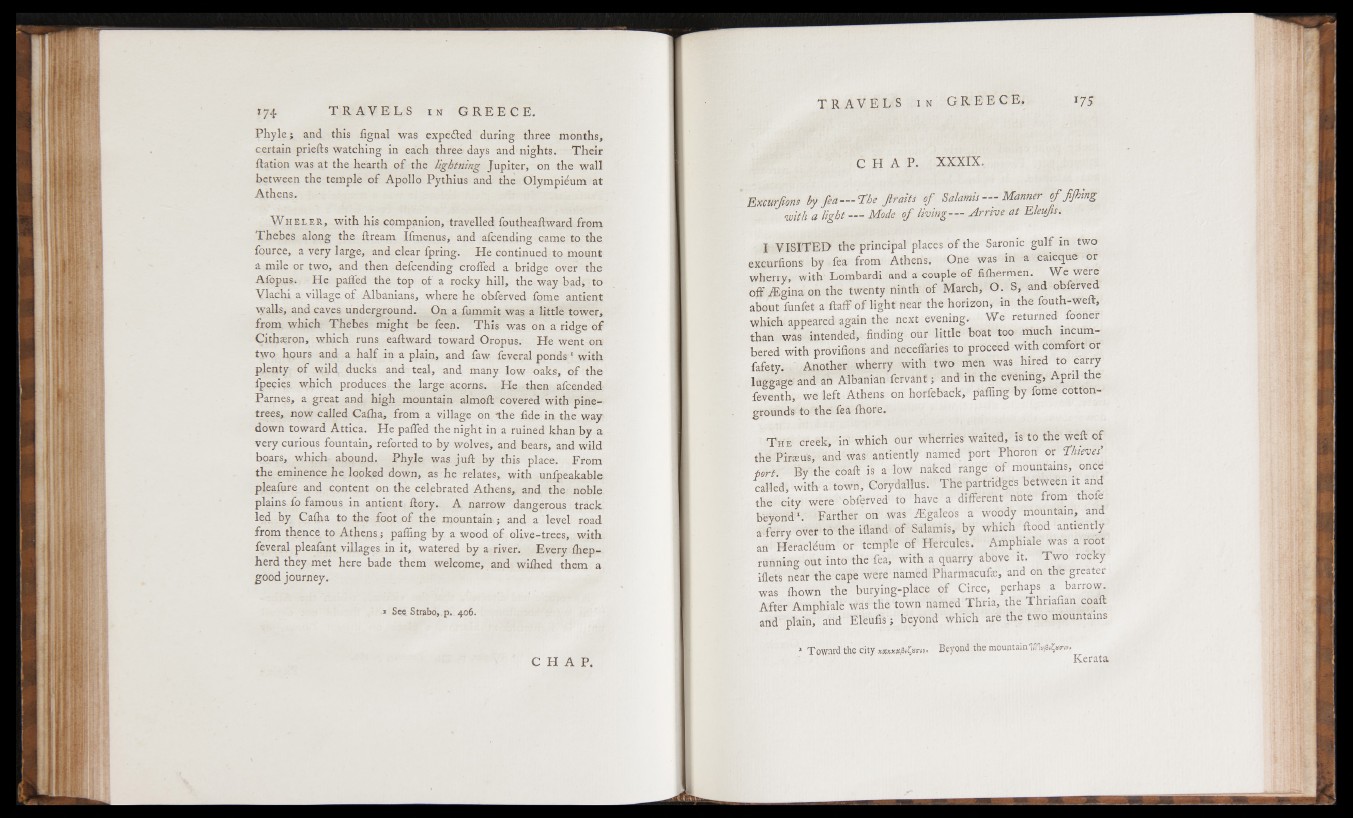
*74 T R A V E L S i n G R E E C E .
Phyle ; and this fignal was expected during three months,
certain priefts watching in each three days and-nights. Their
Ration was at the hearth o f the lightning Jupiter, on the wall
between the temple o f Apollo Pythius and thè Olympiéum at
Athens.
W h e l e r , with his companion, travelled foutheaftward from
Thebes, along the ftream Ifmenus, and afcending came to the
fource, a very large, and clear fpring. He continued; to mount
a mile or two, and then defcending croffed a bridge over the
Afopns. He paffed the top of a rocky hill, the way hadij to
Ylachi a village o f Albanians, where he oblèrved fome an tient
and caves underground. ,Qn^ at fu.mrr¥t was a little tower,
from, which Thebes might be feen. This was on a ridge of
Çi.thaçron, which runs eaftward toward Oropus;. He went on?
two hpurs and a half in a plain, and few feveral ponds1- with
plenty o f wdd ducks, and teal, and many low oaks, o f the
fpeçies which produces the large. acorns. He,;then iafG§nded
Parpqs> a great and high mountain almoft covered with pine-
trees* now-called Cafha, from a village on -the fide: in- the way-
down toward Attica. He paffed the night in a ruined khan by a
very curious fountain, reforted to by wolves, and bears, and wild
boars, whichF shpupd, Phyle was. juft by this place. From
the eminence he looked down, as he relates, with .up^eakable
plcafure and content on the celebrated Athens* and the noble
plains ft) famous in antienti ftory.. A, narrow dangerous track
led by Cafha to the foot.of the, mountain; and a.'level road
from thence to Athens.; palling by. a wood, of olive-trees, with
feveral pleafent villages in it, watered by a river. Every Ihep*-
herd they met here bade them welcome, and wilhed them a
good journey.
•i Sea. Strabo,, p.406.
C H A P . XXXIX.
Ex'eUrfiom ty Jia— fh e J lta iti i f Salamis- - -MdMér
W $ B m d fig k l? “ - Mode o f fp in g -T - Arrive-at Eleufu
I VISITED1 the principal places o f the Saronic gulf in two
exöüriions by Tea-from- Athens*- Gnu was in a ca& q u é or
wherry, with Lombardi and a Couple of filherthen. We were
offfRginu on the twenty niftth’ o f Match, O. S; and obferved
about fimfet a ftaffof' Kght near the horisson, in the fouth-weft,
which appeared'again the next- evCmUg, We returned fooner
than ,was- .ftiteödedi- finding oftt little boat too much incum--
bered with- provifions and neceffaries to'proceed with comforter
fefety. ’ Another wherry with tWo men was hired tö carry
luggage: and ah Albanitóefvahf ; and in the evening,- April the
feventhy wé left -Athens on horfebac'k, piaffing by fome' cotton-
grounds to 'thé fè& Ihoré.
\ Töfe; ereêk, in' which our whefries Waited,"!#tó thè! weft o f
the Pi®its, and was antiently named port Phoroff of’ ThiéVé/-
j f P ByHKe-éoaft is a low naked range; o f ;mountains; oncé
cSHei-With* aTS&Wiv Cbi^iMhiê. : Thé j>aftridgds bet&efen it and
t i e - d i f f e r e n t ' nbte'from thofér
beyond1. - Farthet od was TEgaleos a woody mountkini and
a.fer;ry over to the ifland of Salamis, by which ftöbd antfenthf
afi Hetófefétlm' or fernpfe ó f Hétcule^.fi ;-AtópHfflr a
running out into the lea; with-a qiiRrry abbve it. Two rocky
iflets near the cape were named Pharmacufe, and on thffe greater
was Ihowii the ^burying-place o f Circe, perhaps
After Amphialè was the town named Thria, the Thriafian ébaft
and' plain, add Êlehffs'; b'eybnd 'Which are'the two mountains
* Toward the city Beyond the mountainWv,e,^„.